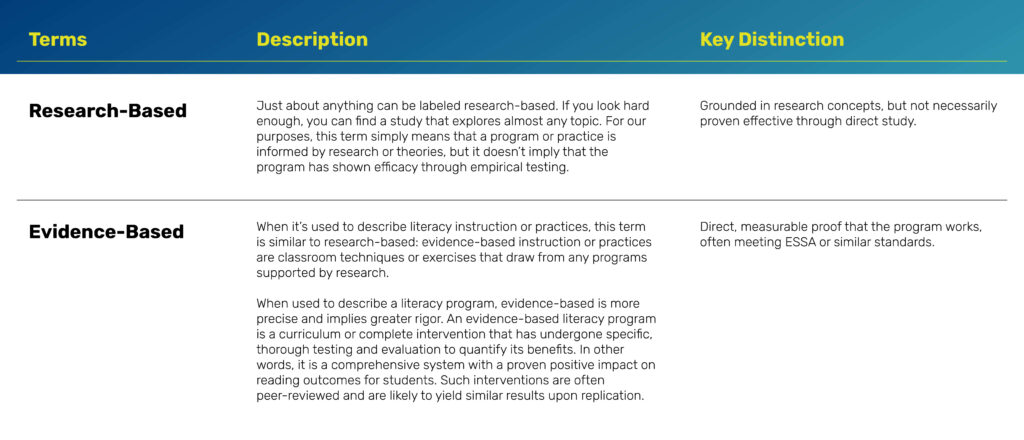The U.S. Department of Education (DOE) has made “evidence-based literacy instruction” a nationwide priority as educators work to reverse widespread literacy deficits with proven methods in the classroom. Despite this emphasis, many educators aren’t sure what evidence-based actually means and how it differs from another common term, research-based. The issue becomes even more complicated when you consider that there is a key difference between evidence-based instruction or practices and evidence-based programs.
In this post, we’ll clarify what each of these terms means, why the distinctions matter, and how IMSE’s Structured Literacy approach exemplifies evidence-based literacy programming in action.

Here’s a video from the Yale Center for Dyslexia and Creativity discussing why “evidence-based” implies a higher standard of evidence than “research-based.
Why These Terms Matter
1. Selecting Instructional Programs
For schools and districts, the language used to describe literacy programs is a signal of the quality and extent of evidence supporting them. Understanding these distinctions helps educators choose programs that are not only well-designed but also have a track record of effectiveness.
2. Funding and Compliance
Knowing the difference between research terms can also be critical for funding eligibility and compliance. For example, the Every Student Succeeds Act (ESSA) requires certain federally funded interventions to be evidence-based. Selecting the wrong type of program could mean your school or district misses out on grants or falls short of mandated Title funding standards.
How IMSE Puts These Terms into Practice
IMSE is deeply committed to evidence-based literacy instruction rooted in the science of reading. Our programs are designed and delivered to meet high standards for both research alignment and proven impact.
- IMSE’s instructional design is grounded in decades of literacy research, ensuring our methods are in sync with cognitive science and best practices for reading acquisition.
- The IMSE Orton-Gillingham Plus program has earned the ESSA Tier II seal from LXD Research and the Silver Efficacy certificate from the International Center for Education Innovation & Evaluation (ICEIE). These recognitions confirm measurable, positive literacy outcomes and meet federal standards for evidence-based practices. In addition, IMSE’s Orton-Gillingham Plus program earned the ESSA “Promising” evidence distinction, which denotes “well-designed and implemented correlational study.”
IMSE’s OG+ curriculum was evaluated with 1,183 students from two Michigan school districts, comparing the program to standard “business as usual” literacy practices. Students using IMSE’s OG+ curriculum demonstrated significantly greater growth in Oral Reading Fluency (ORF) than their peers, particularly in Grades 1 and 3. - IMSE also integrates research-based strategies into its professional development, equipping educators with the tools to translate research into classroom success for diverse learners.
The distinctions between research-based and evidence-based are important to understand. As national conversations continue over instructional quality and funding, we’ll all need to be speaking the same language to ensure students get access to the effective literacy instruction they urgently need. As always, IMSE remains committed to supporting that mission with teacher tools, resources and curriculum that meet and exceed evidence standards.
Like what you read?
